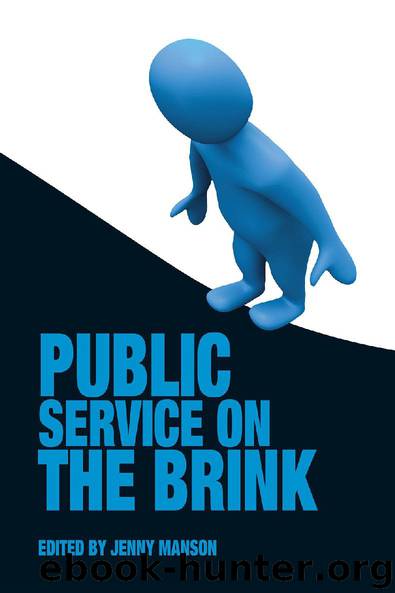Public Service on the Brink by Jenny Manson

Author:Jenny Manson
Language: eng
Format: epub
Tags: Public service, politics, reorganisation, trade union, civil service, government, local government, privatization, NHS, health, education, public management, university, welfare state, railways, legal aid, citizens advice, sociology, reform, public sector, cuts, coalition, public spending, austerity
ISBN: 9781845403539
Publisher: Andrews UK Limited 2012
Published: 2012-03-13T00:00:00+00:00
At the same time, comprehensive reorganisation stalled. Central government was no longer prepared to leave it to educationists or Local Authorities to set the way ahead. Politicians began to talk up the importance of competition between schools as a means to improve quality and highlighted the right of parents to have a choice of school. An attempt was made to find alternative education providers to finance City Technology Colleges. Rising unemployment led to extreme anxiety about educational standards and distrust of ‘progressive’ methods of teaching, all of which culminated in an overwhelming emphasis on testing and assessment of both pupils and schools to see how they were matching up to the demands of the national curriculum. OFSTED was established in 1992 as a more systematic way of inspecting schools and ensuring accountability. All of this was against a background of severe restrictions in public spending which LEAs could do little about since their ability to raise money locally had been curtailed by rate-capping.
Under the New Labour government, elected in 1997, there was a welcome injection of funds but no change of direction. The suspicion that public servants were ‘vested interests’ and somehow just in it for themselves was still there. A storm of initiatives followed to formalise schools’ responsibilities for all aspects of pupil development, personal, social and health education, sex education, citizenship and so on. Most of the assumptions that lay behind the changes since 1988 were accepted; national politicians now felt that they, not professional educationists, should determine what was to be taught and even methods of teaching. National testing became even more important. The drive to reduce still further the role of LEAs (or rather Local Authorities - education committees were eventually abolished) continued with the creation of more schools funded directly by central government and the promotion of ‘diversity’ - as between types of schools, certainly not in relation to what was taught. The original national curriculum had proved far too detailed and burdensome and was gradually pared down, but despite the commissioning of a number of reports, little encouragement was given to innovative curriculum development; politicians were satisfied with lists of traditional subjects familiar to them from their own schooling. What they were interested in was measures designed to show whether and how much improvement was being made in schools, and they were anxious not to offend the middle classes whose interests had been well served by conventional approaches.
The coalition government (May 2010) finally abandoned the idea of a ‘national system locally administered’ opting for a push towards complete fragmentation, strongly encouraging all schools to cut their links to LAs and to become state funded independent schools. The belief that competition between schools was the best way to raise standards overall was unshaken; choice was what mattered, parents would choose successful schools, less successful ones would close, and with diversity of provision would come innovation and progress. Accountability would be achieved by the regime of tests, public examinations and league tables. At the same time,
Download
This site does not store any files on its server. We only index and link to content provided by other sites. Please contact the content providers to delete copyright contents if any and email us, we'll remove relevant links or contents immediately.
Weapons of Math Destruction by Cathy O'Neil(6281)
Cracking the GRE Premium Edition with 6 Practice Tests, 2015 (Graduate School Test Preparation) by Princeton Review(4294)
What It Really Takes to Get Into Ivy League and Other Highly Selective Colleges by Hughes Chuck(3760)
Fooled by Randomness: The Hidden Role of Chance in Life and in the Markets by Nassim Nicholas Taleb(3124)
The Tyranny of Metrics by Jerry Z. Muller(3073)
The Marketing Plan Handbook: Develop Big-Picture Marketing Plans for Pennies on the Dollar by Robert W. Bly(3064)
Ultralearning by Scott Young(2957)
The Official Guide for GMAT Review 2015 with Online Question Bank and Exclusive Video by Graduate Management Admission Council (GMAC)(2808)
Bull by the Horns: Fighting to Save Main Street From Wall Street and Wall Street From Itself by Sheila Bair(2779)
50 Economics Classics by Tom Butler-Bowdon(2576)
The Visual MBA by Jason Barron(2163)
The Inevitable by Kevin Kelly(1976)
Data Science for Business by Foster Provost & Tom Fawcett(1972)
Cracking the LSAT, 2012 Edition by Princeton Review(1956)
Out of the Crisis by Deming W. Edwards(1901)
GMAT Official Guide 2018 Verbal Review by GMAC (Graduate Management Admission Council)(1870)
The Personal MBA: Master the Art of Business by Josh Kaufman(1832)
The Conflict Resolution Phrase Book by Barbara Mitchell & Cornelia Gamlem(1779)
Maths and Stats for Web Analytics and Conversion Optimization by Himanshu Sharma(1709)
